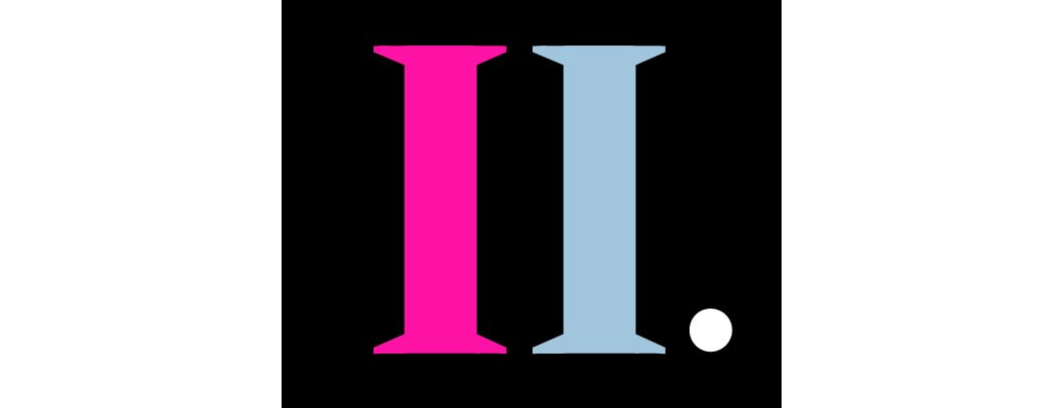Thank you for attending!
RESPONSE TO ASHA CAA'S REMOVAL OF DEI STANDARDS FOR ACCREDIATION
Dr. Dani Scott's Response:
"Of all the forms of inequality, injustice in health is the most shocking and inhuman."- Rev. Dr. Martin Luther King Jr.
The current 3.4 A/B Standard is relatively new, updated in 2023 amid rising calls from ASHA members, particularly influenced by the Black Lives Matter movement and in response to the health disparities made glaringly obvious by the COVID-19 pandemic and growing advocacy from scholars and practitioners for a more systemic approach to preparing students to provide equitable and inclusive services.
In my roles as both a tenure-track assistant professor and associate clinical professor, I have developed and delivered curricula focused on diversity, equity, and inclusion. I have taught courses including Cultural Humility, Culturally Responsive Practices, DEI in Speech-Language Pathology, and DEI Seminar—courses that equip graduate students with essential knowledge and skills to provide ethical care while dismantling barriers to health and educational equity. As a Black woman in the predominantly white field of speech-language pathology, teaching this content carries deep personal significance. My lived experiences with healthcare inequities inform my instruction and bring authenticity to these critical conversations. These courses have proven transformative for my students, fundamentally shifting how they understand their role as future clinicians and advocates for equitable care.
Here is a quote from a second year graduate student about her experience with DEI courses implemented as a result of the current 3.4A/B Standard:
“I owe my preparedness and knowledge to X and the DEI curriculum that she built at XXX. She has created classes, that when worked through while fully engaged + committed can bring depth and meaning to therapy. X has taught me to make space for people to share their lived experiences as well as engage in therapy authentically. These required classes have changed me from being afraid to talk about race and culture to being humble and confident in my abilities to enter into meaningful and difficult conversations. Perfection isn’t attainable or possible, but humility is. I have and will make mistakes, but I know I can apologize and learn for next time. When you learn better you need to do better. I have learned how different therapy, and the therapeutic space can be when you decide to do better. I am deeply honored to be a part of a group of students that were the first to complete all of the DEI courses. I hope my words have conveyed to you how valuable these courses are to me and to the SLHS field. I would not have gained this experience and knowledge at another university. The work X is doing with CDIS students is cutting edge and powerful. Her work and dedication have changed my life, but also all the lives of the students I will treat in my future practice.”
Without the current 3.4A/B standard these essential curriculum changes would not have been possible, and programs would be invited to exclude content that supports students’ development of knowledge and skills to meet ASHA’s mission, making effective communication a human right, accessible and achievable for all. Standard 3.4/B should continue to align directly with the ASHA Code of Ethics, which already includes anti-discrimination principles. A DEI framework encourages our field to re-imagine, examine, and counteract systems of racism, ableism, and other deeply rooted systemic inequities. A “family centered and person centered approach” does not, by any means.
Education has always been and will continue to be a political enterprise; therefore, it is critical to interrogate the foundational social, political and ideological forces that sustain and uphold it. Nonetheless, it is imperative for us as a profession to be innovative and strategic in the language used, so that ethical, inclusive practices may continue amid banning terminology that aligns with DEI efforts. Higher education accreditation agencies and professional organizations can empower faculty, determining from outside the institution what language is appropriate and required for learning to take place (Batker & Turpin, 2023).
We must ask ourselves: who is likely to be harmed by this proposed change? Even while individual states are making changes, if the CAA, the entity created to establish and enforce a set of standards for the accreditation of graduate education programs in audiology and in speech-language pathology, does not maintain the institutional accountability for equity and justice in our curriculum standards, this is increase the disproportionate negative outcomes for all clients, with an additional tax on the most marginalized clients and professionals.
If the CAA is truly committed to quality, and dedicated to audiology and speech-language pathology programs’ success in preparing future professionals, it is imperative that we maintain the 3.4A/B Standard to ensure that DEI is not deemed optional; it is fundamental to ethical practice.
Dr. Megan Mahowald's Response
In 2020, following the murder of George Flyod for the first time, in many spaces, racism and ableism were talked about, acted upon and even legislated including a necessary addition of Diversity, equity and inclusion to our ASHA Accreditation standards.
Diversity, Equity and Inclusion was a framework adopted to address macro, societal, systemic racism and ableism that have been not only prevalent but often a driving force in speech-language pathology, education and medicine. The terms
Diversity, Equity, and Inclusion (DEI) are meant to promote justice and fairness in institutions, especially around race, gender, disability, and other marginalized identities. A DEI framework allows our field to rethink, examine, and counteract systems of racism and ableism.
A family centered and person centered approach does not.
Evidence of systemic racism in medicine is well documented, from disparities in maternal and infant mortality, pain management and medical algorithms that are designed to adjust based on race (without substantial evidence there are race-based medical differences) and access to quality healthcare. Evidence of systemic racism in education is well documented with school funding disparities, disproportionate discipline for Black students and the school to prison pipeline. Students of color being overrepresented or underdiagnosed as well as our Eurocentric history, literature and norms despite “minority population” becoming the majority in our public schools.
These are not isolated statistics or trends, these are signs of a system built with embedded biases that continue to reproduce inequity. The outcomes (health disparities, academic achievement gaps, differential discipline in schools) are predictable and measurable - therefore systemic.
By removing language around DEI in our academic standards we are ignoring the impact that systemic racism, ableism, bigotry towards the LGBTQ+ community, we are in essence saying that if we treat the individual we help the individual or if we look at the family system and help the family system then we are improving communication and swallowing. This is irrevocably false.
Speech-Language Pathology was founded on the basis of “fixing” people’s communication, through dialect training or rehabilitating those “back to normal” but we need to recognize these threats to our current system. It is no accident SLPs are largely white and female and this has not systematically changed despite much effort to do so. The very nature of the work we do needs to be examined. By ASHA capitulating with these DEI standards it not only upholds the majority white centered field, white supremacy, ableism and outdated gender normative views - it actively harms our patients, clients and students. We will also continue to actively harm our SLPs and Audiologists and students who are not white, middle class CIS gender women if we continue to approach our work in communication and swallowing as an individual or family issue rather than view individuals in a systemic context.
In revolutionary times, we all have a choice, we can throw our hands up and surrender despite that we know it is wrong OR we can actively resist and do what is best for humanity. I would hope ASHA continues to use its wealth of resources to resist and uphold justice. To put our humanity first and to uphold what we know is right and true. Systems harm people and impact care often in a negative way and we must teach the next generation of SLPs and Audiologists to act. We must teach them to dismantle these systems to give our shared humanity hope and a chance to thrive.
A simple act of ASHA CAA upholding these standards is necessary to give our field an opportunity to not only survive but thrive in the future. If not, it will chip away at what we have gained in our field about being community-centered, caring and evolving and devolve back to what we used to be - a field of white, privileged academics dictating who should have access to the human right to communicate.
I do not have any suggestions for changes to these standards as I believe they were written with not only a context in mind, but the future of our field. These DEI standards should remain as they are written.
We strongly believe that in order to make any progress in our field, to break through white supremacy and ableism, we must continue to uphold Diversity, Equity and Inclusion Frameworks. A reminder that Culture Flex is a framework we developed to help SLPs understand- "Understanding power structures and flexing between cultural groups is an additional element of the social justice orientation. Imagining a pathway to social justice in the education setting requires educational SLPs to examine the historical sociopolitical context of education in theUnited States, which is marked by colonialism (Duchan & Hewitt, 2023).
Our Work
This page includes links to the work we have accomplished in the Diversity, Equity and Inclusion space and our expertise areas.
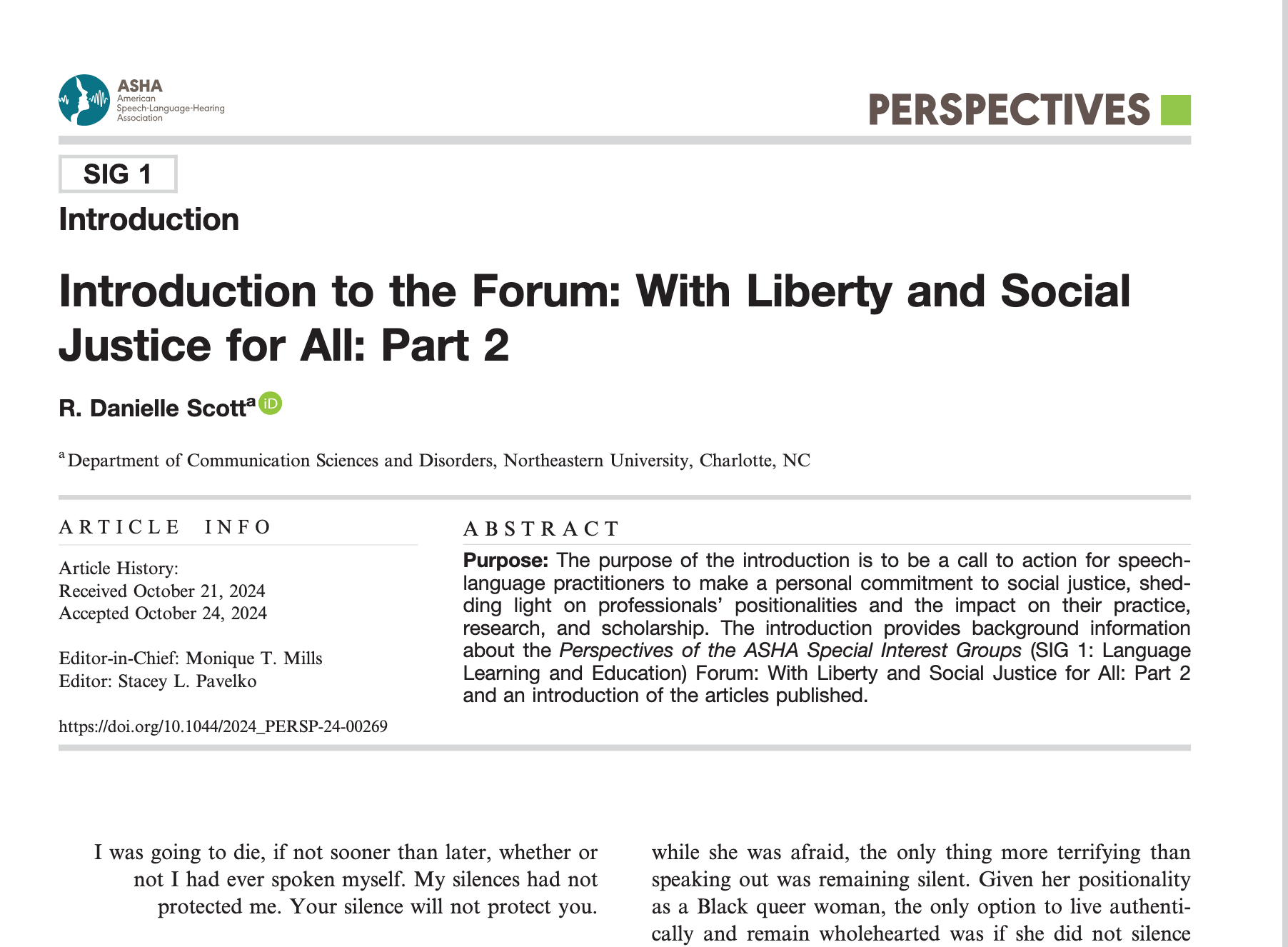
Dr. Scott was a guest editor for a two part forum for Perspectives:
Introduction to the Forum: With Liberty and Social Justice for All: Part 2
Posters presented at the National Black Association of Speech, Language & Hearing's annual convention, 2025
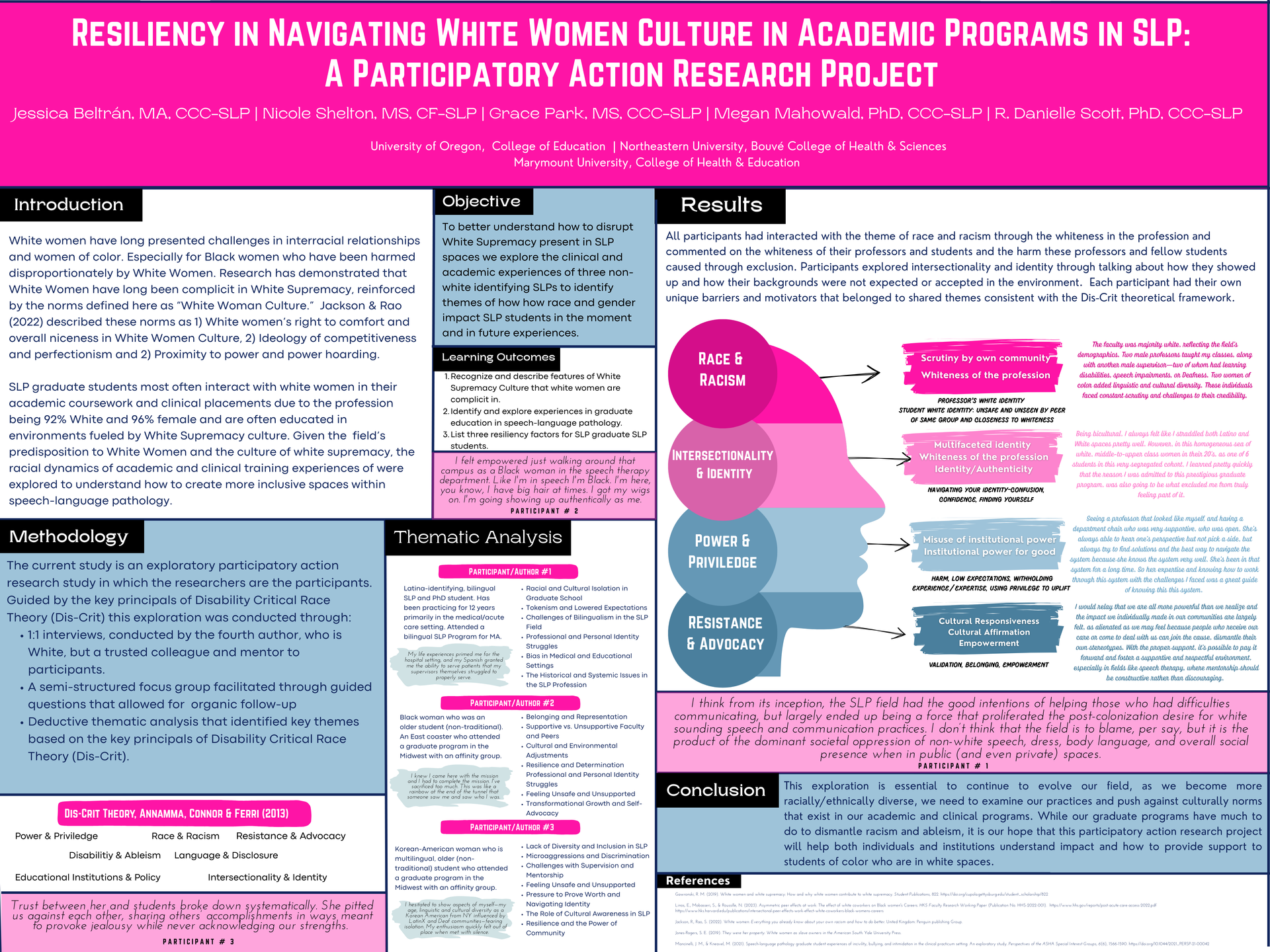
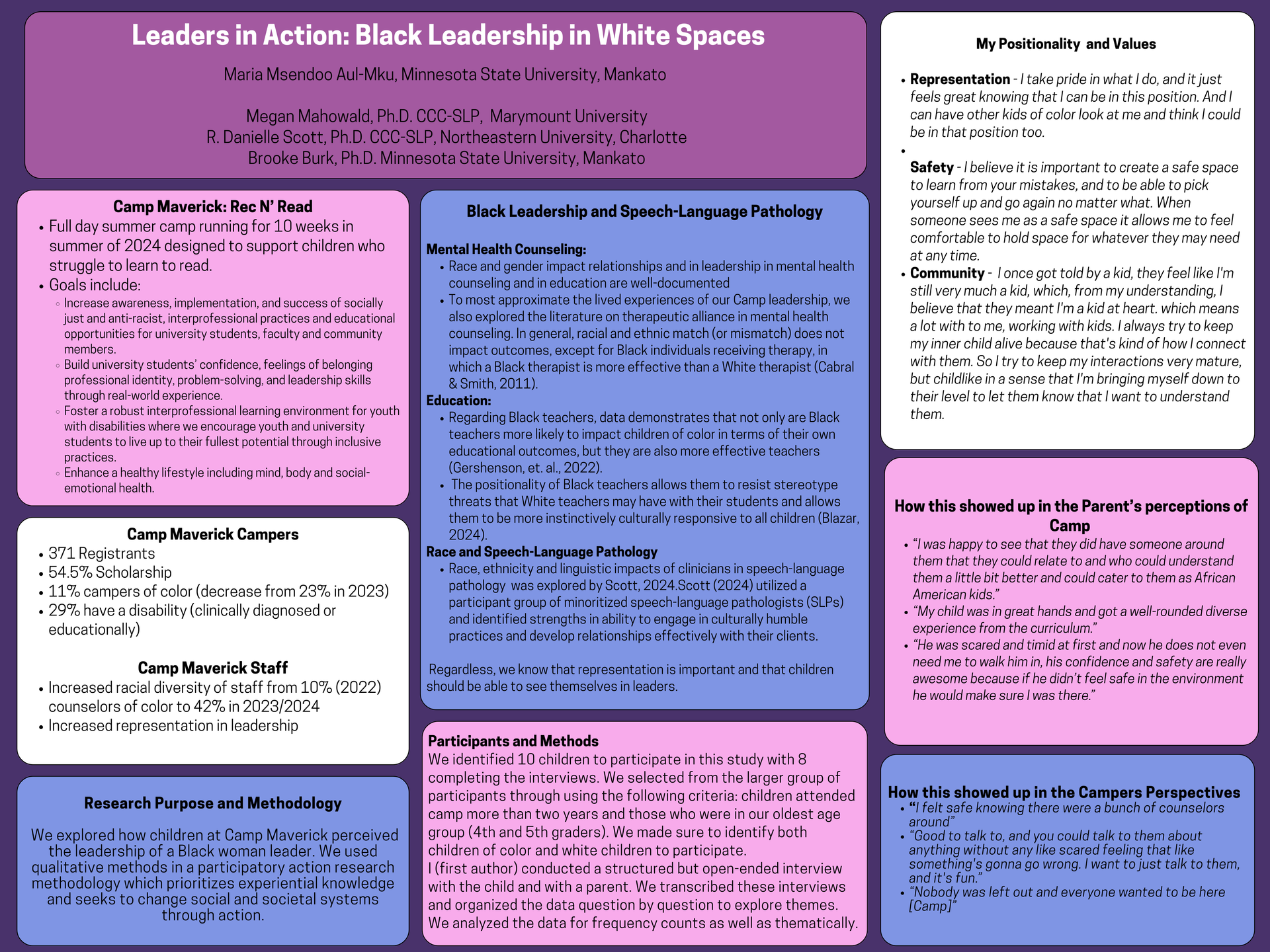
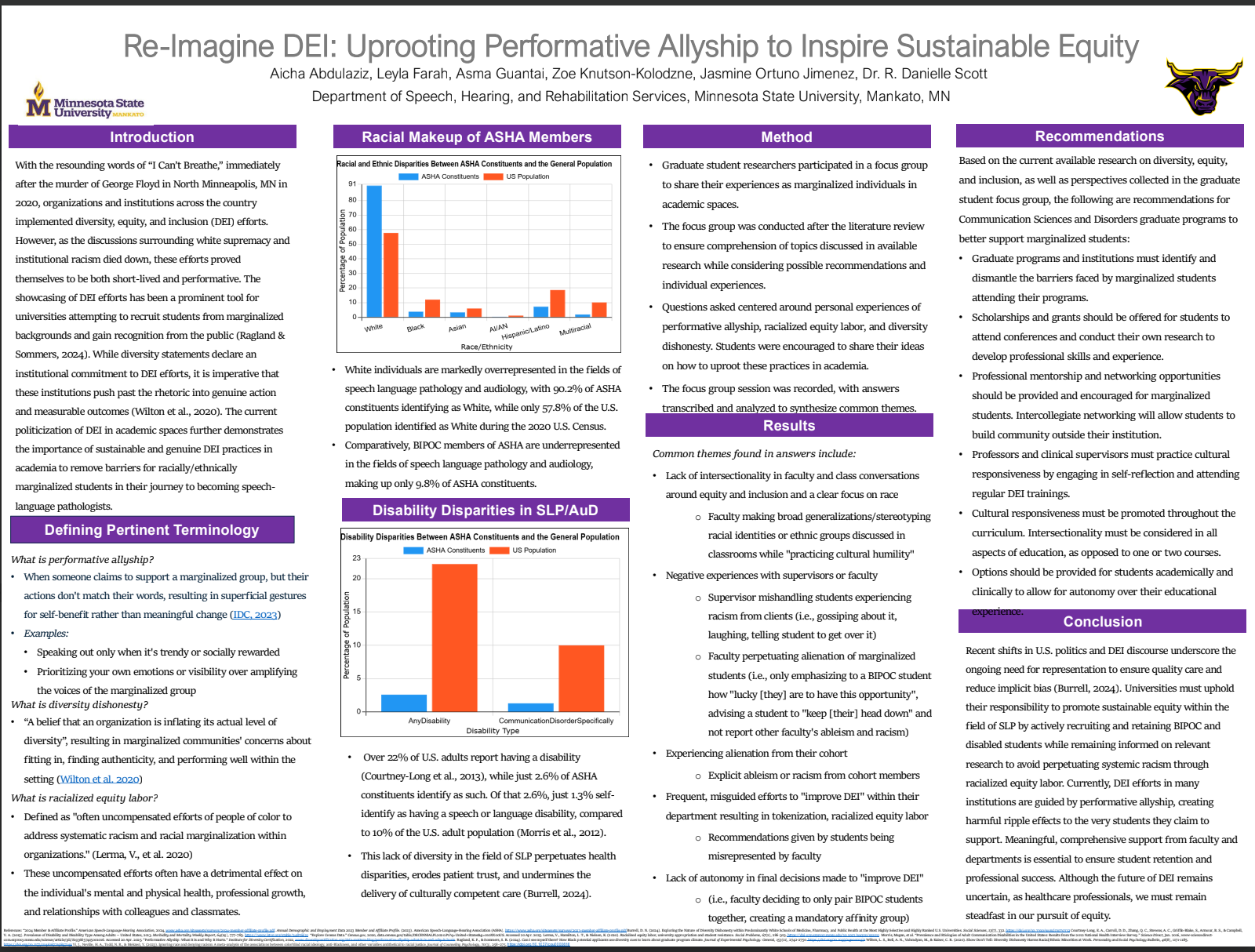
ASHA Leader Article
This article details a program designed by Megan and Dani. This unique program received national attention.
ASHA Voices Podcast
A panel of faculty members from CSD programs discuss recruitment and retention of diverse and underrepresented CSD professionals. In this first of two parts, guests share personal experiences with and insights on holistic admissions.
ASHA Voices Podcast
The second part of our conversation on recruitment and retention of diverse and underrepresented CSD professionals. Panelists discuss creating an environment that can attract and retain a diversity of students.
Journal Articles
A 4-week professional development course for current and future faculty is described using a lens of cultural humility, to explicitly integrate anti-oppressive pedagogy into course design.
Rooted in Black Language, the authors introduce the “culture flex” as a practice of engaging in social justice work. Social justice is necessary to carry out the vision of the American Speech-Language-Hearing Association: effective communication as an accessible, achievable human right for all. The purpose of this tutorial is to define and describe a multifaceted conceptual pathway toward social justice–oriented speech-language practices. The authors acknowledge and interweave their positionalities, their own social justice journeys, and educational speech-language practices experiences to explain the “cultural flex” framework as a pathway for enacting social justice.
Counseling and Cultural Humility
North Carolina Speech-Language-Hearing Association
